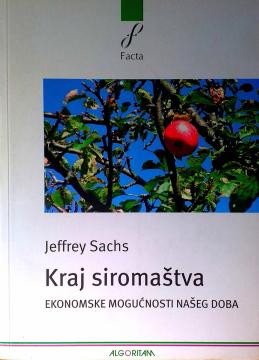
Kraj siromaštva: Ekonomske mogućnosti našeg doba
In the book, economist Jeffrey Sachs presents an optimistic plan for eliminating extreme poverty by 2025. He argues that this is feasible with political will, because world wealth is growing, and poverty is not fate, but the result of inefficient systems.
Sachs introduces "clinical economics" - a systematic approach to treating a disease: diagnosis of the problem, prescription (interventions), and monitoring. He focuses on the poorest countries in Africa, Asia, and Latin America, where billions of people live on less than $1 a day. Key causes: geographical barriers (tropical diseases, droughts), lack of investment in infrastructure, education, and health, and political instability.
He proposes a three-pronged plan: (1) Urgent aid for the "big fight" - networks for malaria prevention, AIDS, distribution of seeds and fertilizers for agriculture; (2) Long-term development - building roads, schools, clinics; (3) Global cooperation - increasing support from rich countries to 0.7% of GDP for development aid, debt cancellation, and non-discriminatory trade rules.
The book is replete with case studies: Sachs's success in Bolivia (1985, hyperinflation stopped), Poland (shock therapy), and Zambia (malaria controlled). He criticizes the West for ineffective aid and calls for support for the Millennium Development Goals of the UN. It concludes that poverty is not inevitable – with $175 billion a year (less than 1% of global GDP) we can save lives, prevent wars and boost growth.
Sachs's vision is inspiring, but critics warn of the risks of dependence on aid. Nevertheless, the book remains a manifesto of humanism in economics.
One copy is available





